Premium
Igad, African Union collateral damages for Tigray war
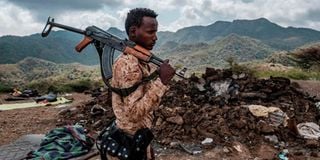
A member of the Afar Special Forces stands in front of the debris of a house in the outskirts of the village of Bisober, Tigray Region, Ethiopia on december 9, 2020.
Ahead of this week’s crucial visit to Ethiopia by President Joe Biden’s new Horn of Africa envoy, Jeffrey Feltman could not have been blunt about the grim prospect facing Ethiopia. His warnings should send a chill down the spine of those following the unfolding in the Horn of Africa.
Failure to manage the growing tensions in Ethiopia, Feltman warned, would make “Syria look like child’s play by comparison.”
Known in the global diplomatic circle as a seasoned hand, his voice was heard loud and clear in Washington DC. Four members of the US Senate’s Foreign Relations Committee have urged Ambassador Feltman to persuade Addis Ababa to guarantee unfettered access for humanitarian responses, ensure the immediate withdrawal of the Eritrean army, and non-state troops, as well as allow for international investigations of war crimes committed in the northern parts of the country.
These, the Senators believe, should not be matters dealt with separately, but crises of “interwoven nature” requiring “holistic strategies.”
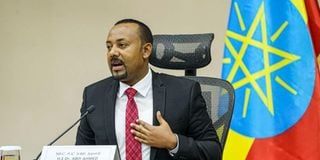
Ethiopian Prime Minister Abiy Ahmed speaks at the House of Peoples Representatives in Addis Ababa, Ethiopia, on November 30, 2020, on the conflict between Ethiopian National Defence Forces and leaders of the Tigray People’s Liberation Front.
Africa was supposed to have developed such a holistic strategy to assess trouble spots, engage parties in conflicts through elaborate dialogue, and deploy forces to fulfill responsibilities to protect. When designed in the early 2000s, the African Union peace and security architecture was thought to be a radical departure from its predecessor, the Organisation of African Unity (OAU).
Non-interference
OAU’s cardinal rules of non-interference in the internal affairs of member countries were held dear by its founding fathers. Informed by a series of coup de tête, civil wars, and crimes against humanities committed in the 1980s and 90s, the AU founders felt the need to change course. When member states fail to protect their population or become the very source of the atrocities, the AU took upon itself to challenge.
The norms and principles of the African peace and security architecture are made to be incorporated in the five institutions created to prevent, manage and resolve conflicts. Of these, the Peace and Security Council has been the most active, while the Panel of the Wise and the Continental Early Warning System have modest functions. In contrast, the Standby Force and the Peace Fund have yet to be activated.
The 15-member council for peace and security - along with an initiative the chairperson of the African Commission may take - lifts much weight in determining where and how to intervene. Since its foundation, the AU suspended Mali and Egypt from membership and threatened to banish Sudan after its military deposed Hassan Al Bashir, its leader for 30 years.
Currently chaired by Kenya, the Council was hoped to answer to Ethiopia’s leaders' rhetoric of “African solutions for African problems” when war broke out in the Tigray Regional State in November last year.

Ethiopian soldiers rest in front of the entrance to the 5th Battalion of the Northern Command of the Ethiopian Army in Dansha, Ethiopia, on November 25, 2020.
Any earlier effort by the Chairperson of the AU then, South Africa's Cyril Ramaphosa, dispatched eminent personalities to Addis Ababa was granted cold reception. A team of three elders - Ellen Sirleaf of Liberia, Kgalema Motlanthe of South Africa, and Joaquim Chissano of Mozambique, all former presidents moonlighting for the Panel of the Wise - were told Ethiopia’s business was internal matters to worry on its own.
Prime Minister Abiy Ahmed’s government framed the war in Tigray as a “law enforcement” exercise targeting a few of reneged leaders of the Tigray People Liberation Front (TPLF), a leftist insurgency instrumental in deposing the military government of Mengistu Hailemariam (Col.) in the early 1990s. It morphed into a ruling coalition under the EPRDF, where the TPLF’s influence lasted until Mr Abiy disbanded the ruling coalition two years ago.
The genesis and evolution of the war in Tigray have been anything but law enforcement operations. The full force of Ethiopia’s army, with all its ground and Air Force assets, was involved alongside militia forces of neighbouring regional states, not to mention the introduction of drone warfare supplied, arguably, by a non-Africa country.
The most vexed issue is the onslaught against Tigrayan forces by the entire Eritrean army, initially denied by Addis Ababa until their presence was a matter that can be concealed no more.
While the war was raging in Tigray, ironically, the last summit by the African heads of state held in February - virtually - wanted to “silence the guns” in the continent. Mr Abiy and his diplomats successfully rebuffed it from raising an issue that was transpiring a few hundred kilometers from where the AU Commission and its situation-room for conflict early warning system are housed. The summit pretended nothing of the sort the trans-Atlantic effort is consumed now was progressing.
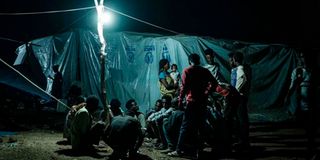
Ethiopians, who fled the Ethiopia's Tigray conflict as refugees, wait to charge their smart phones at Um Raquba refugee camp in Gedaref, eastern Sudan.
But the watershed moment arrived when leaders of Igad members met in Djibouti in December last year after the Chairperson attempted to raise the war in Tigray as an agenda was frustrated by Ethiopia.
After almost a decade, Igad saw a change of guard in its leadership and the secretariat right about at the same time. Sudan took the helm from Ethiopia; and, Kenya’s seasoned diplomat, Mahmoud Maalim, handed over guardianship at the Executive Secretary to Worqneh Gebeyehu, Ethiopia’s former Foreign minister and a staunch ally of Prime Minister Abiy during his ascent to political power.
Mr Abedella Hamdouk, Sudanese prime minister, had to cut short a planned two-day state visit to Ethiopia ahead of the Igad summit. His offer to mediate a truce between Ethiopia’s federal government and Tigrayan forces had angered Mr Abiy, who threatened to withdraw Ethiopia from the club in the face of what he saw was an interference in the internal affairs of a sovereign state. Mr Hamdouk’s Sudan was a recipient of over 63,000 refugees from the Tigray war, hosting them in camps reopened after they were closed 20 years ago.
After nearly three-decade working for the UN Economic Commission for Africa (ECA), headquartered in Addis Ababa, Mr Hamdouk had to leave to assume the role of Prime Minister after delicate negotiations between the revolutionaries and the military. The Ethiopian PM was a major figure in this process, perhaps a bit of irony for Mr Hamdouk to be told to stay away from when Ethiopia finds itself in deep waters.
Shielded from the rest of the world, the ongoing war in Tigray resulted in the displacement of 1.7 million civilians. It severely damaged the credibility of Mr Abiy, a Nobel Peace Laureate, for declaring a war that never ended and claimed no civilians were killed in its executions. Today, the world knows thousands of civilians were killed in cold blood, and hundreds of women were raped. The mayhem, destruction, looting, pillage and systematic deprivations of productive activities in Tigray were never seen in recent history.
Famine in Tigray is inevitable. As this report shockingly documented Starving Tigray is not a by-product of a war gone amok, but a deliberate war strategy executed to the smallest detail to impoverish an entire community.
Igad, and the AU, have abdicated their responsibilities to protect civilians, unable to overcome the legacy of the OAU fending member states from external interventions. Ethiopian authorities could not have it any better when Moussa F. Mahamat, chairperson of the AU Commission, endorsed during the Djibouti summit that Ethiopia’s federal government military campaign in Tigray was “bold steps” aimed to “preserve the unity, stability and respect for the constitutional order of the country.” Perhaps inadvertently, Mr Mahamat declared what Addis Ababa did was “legitimate for all states.”
It is a view conveniently amplified by Mr Billene Seyoum, spokesperson of Prime Minister Abiy. She recently tweeted, “sovereignty and principles of non-interference enshrined in the UN charter are not privileges bestowed upon a few.”
Such was gross omissions, if not misrepresentations, of the constitutive act of the AU under article four. The AU is obliged to intervene in member states if there arise “grave circumstances” of war crimes, genocide and crimes against humanity.
A trans-Atlantic alliance resurrected in the post-Trump world now demands for independent international investigations on all these allegations of the war in Tigray. Mr Feltman arrived in Addis Ababa this week to deliver on these messages in no uncertain terms.
The AU and Igad have chosen to succumb to a relic from the OAU era the Ethiopian government leveraged on for non-interference, no matter what may damage their credibility. The tenet designed to make AU more relevant than its predecessor was undermined, leaving those eager to write its obituary relished.
Ethiopia, hosting the Commission, may have contributed to Africa’s reluctance to reclaim and reassert AU’s norms and principles. However, in the absence of big countries cheerleading, multilateral organisations in Africa or elsewhere become helpless to stand up for these principles. The manifestation of this is Ethiopia and its war in Tigray, which has put the continent’s peace and security architecture inept and irrelevant.
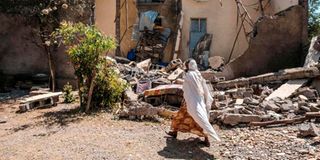
A woman walks in front of a damaged house in Wukro, north of Mekele which was shelled as federal-aligned forces entered the city on March 1, 2021.
In the five months since the start of the war in Tigray in November last year, not one of the 19 meetings held by the Peace and Security Council made a notable concern of the atrocities being committed in Tigray. Bar a call for peace by Mahamat, twice in November and December, though. In contrast, the heavy lifting of addressing the humanitarian crises in Tigray has been done by a trans-Atlantic alliance for the Horn of Africa, overshadowing any meaningful efforts by African institutions.
US Senate Foreign Relations Committee Chair, Jim Risch, could not have been more direct in his conversation with Feltman before his departure to Addis Ababa.
He tweets: “I reiterated the importance of Eritrean troops leaving Tigray immediately. Securing Eritrea’s withdrawal and addressing the atrocities committed in Ethiopia should be central to his trip.”
The Europeans have been more forceful in their demands, even before the administration change in the US brought a shift in tone, if not policy. A statement the Council of the European Union issued in mid-March expressed its “extreme concerns” of testimonies to the possible war crimes and crimes against humanity, extra-judicial killings, and series of human rights violations. The EU took the lead in calling for actions to end these “immediately and for perpetrators to be brought to justice.”
Yielding to such pressures from this alliance, Prime Minister Abiy belatedly acknowledged the role of an African institution - the African Commission on Human and Peoples’ Rights - to undertake investigations on allegations of war crimes and crimes against humanity with the Ethiopian Human Rights Commission. Both these institutions currently led by Ethiopians, Abiy may have in mind his forthcomingness can help him fend off international involvement on a matter he deems are internal affairs.
He appears to have a few friends left from near and afar other than Eritrea’s Issaias Afeworki and Somalia’s embattled Mohammed A. Mohamed (Farmaajo). Back in 2019, the three leaders were jet-setting to their respective capitals, forming a new alliance under the Horn of Africa Council. It is an alliance the Eritrean Ministry of Foreign Affairs described as, “a formulation of a new road-map, a task that must be accomplished without compounding external interference.”
Disgruntled for so long due to Ethiopia’s leadership of Igad in the 2000s, what Issaias could offer the new alliance is only his military machine.
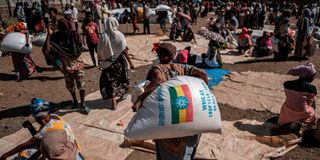
A woman carries a sack of wheat during a distribution of food organised by the Ethiopian government in the city of Alamata, Ethiopia on December 11, 2020.
The push by the Horn of Africa Council against involvement from “interfering” forces no doubt concerns and frustrates neighbouring countries, including Kenya. Its place in the non-permanent seat of the UN Security Council, along Niger and Tunisia from Africa, brought the attention of President Biden. The latter sought the help of President Uhuru Kenyatta to bring the war in Tigray to an end.
Once a close ally to Ethiopia in matters that is IGAD, Kenyan diplomats' repeated efforts to bring Prime Minister Abiy into their orbit had borne no fruit. They had thought keeping him busy with a series of state visits to Kenya could have kept him away from the “bad boys” in the region. His last state visit of two days, immediately after he had prematurely declared “mission accomplished” in Tigray, was part of a deliberate effort to extend a sympathetic gesture to show how much Kenya values its relationship with Ethiopia. Kenyan diplomats would find it hard to admit that it is a tactical manoeuvre with nothing to show for.
Addis Ababa remains fortified and increasingly defiant of the pressure from the trans-Atlantic alliance, standing in contrast to the overriding interest of the Gulf- countries, China and now Russia.
Ambassador Feltman has done himself no good by making public what haunts him ahead of his visit. He will be unlikely to receive a helping hand from the African institutions whose mantra of “African solutions to African problems” has been frustrated by the Africans themselves.
Unable to stand on the sideline, Kenya may have the little leverage to make a difference if it chooses to pursue its place in the AU Peace and Security Council and its seat at the UN Security Council.





